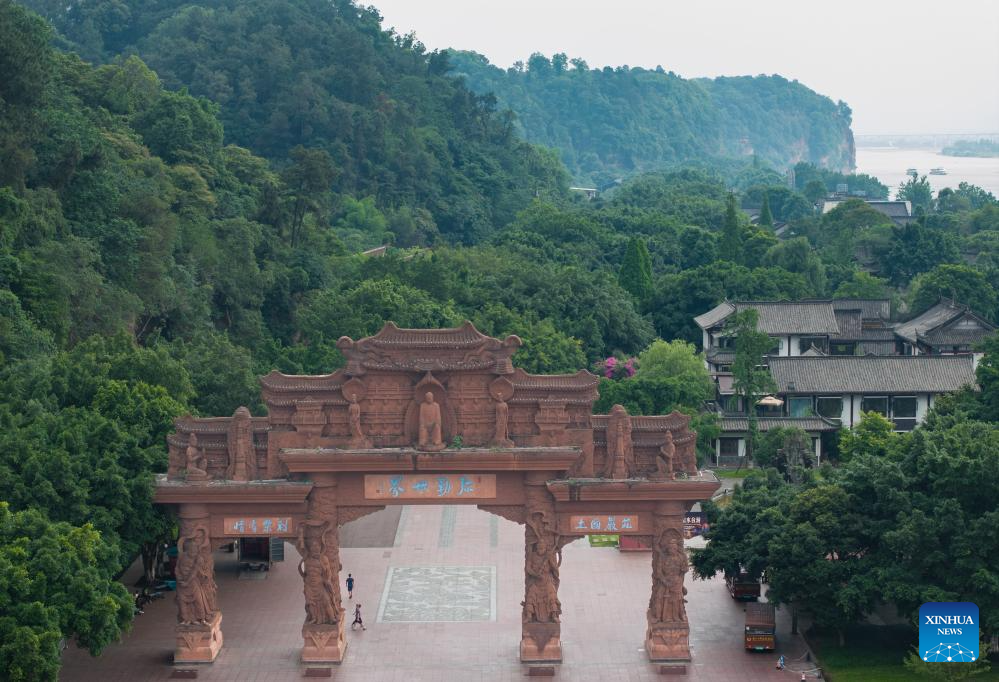
This drone photo shows an archway at the Leshan Giant Buddha scenic area in southwest China's Sichuan Province, June 4, 2024. Carved out of a hillside in the 8th century, the Leshan Giant Buddha is an area of natural beauty into which the human element has been integrated with skill and subtlety. Facing the confluence of the Minjiang, Dadu and Qingyi rivers, the 71 meters tall Giant Buddha of Leshan is one of the most important cultural treasures of China.
The Leshan Giant Buddha was inscribed on the UNESCO World Cultural Heritage list in 1996. (Xinhua/Jiang Hongjing)
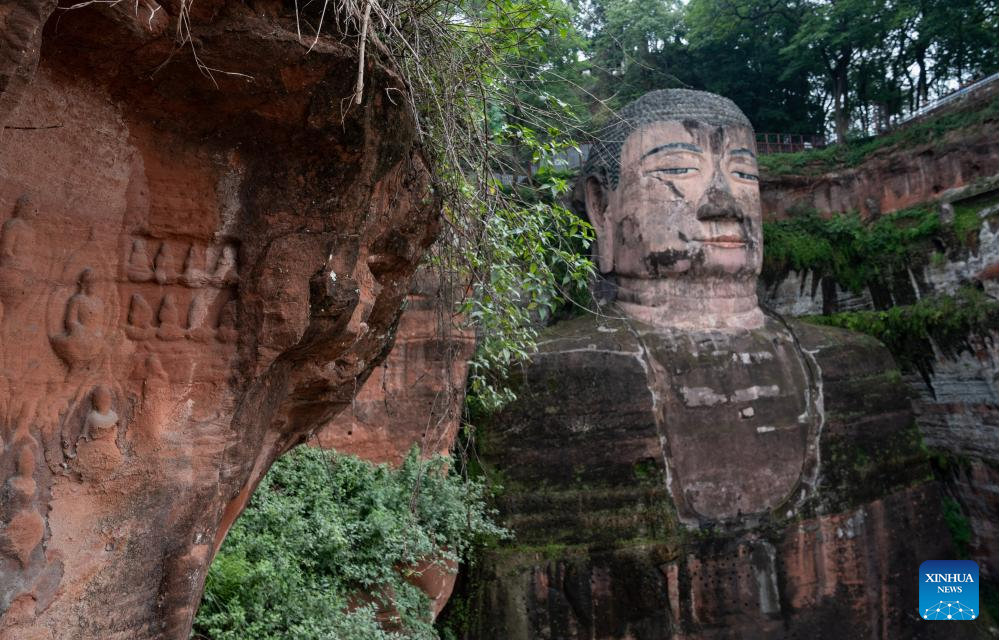
This photo shows a part of the Leshan Giant Buddha in southwest China's Sichuan Province, June 4, 2024. Carved out of a hillside in the 8th century, the Leshan Giant Buddha is an area of natural beauty into which the human element has been integrated with skill and subtlety. Facing the confluence of the Minjiang, Dadu and Qingyi rivers, the 71 meters tall Giant Buddha of Leshan is one of the most important cultural treasures of China.
The Leshan Giant Buddha was inscribed on the UNESCO World Cultural Heritage list in 1996. (Xinhua/Jiang Hongjing)
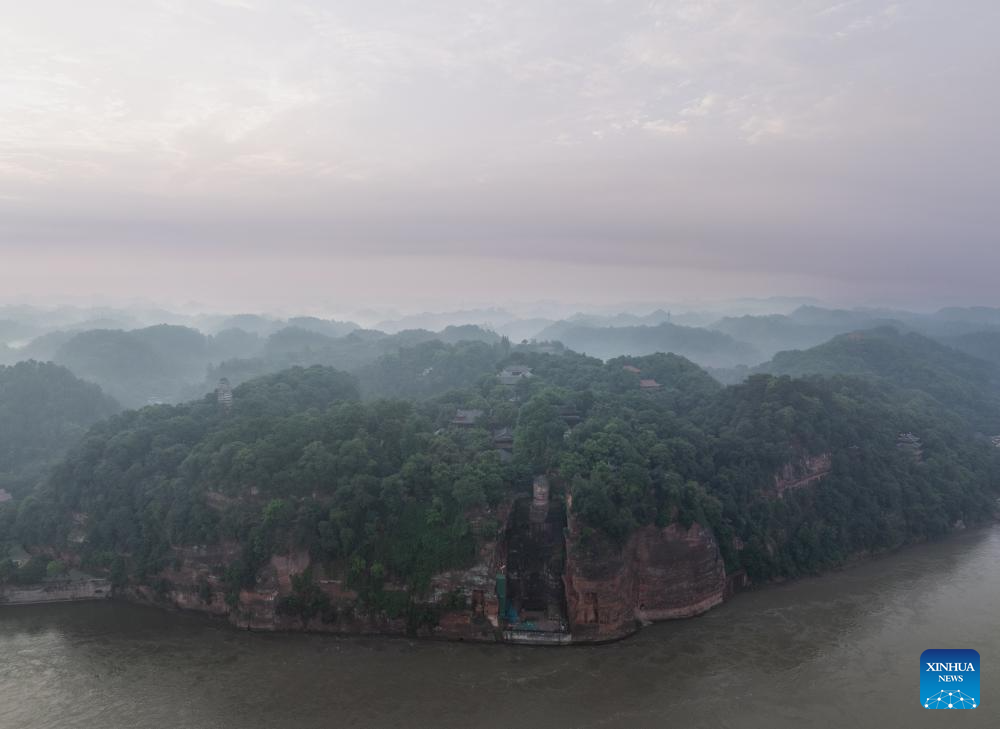
This aerial drone photo shows the Leshan Giant Buddha at dawn in southwest China's Sichuan Province, June 4, 2024. Carved out of a hillside in the 8th century, the Leshan Giant Buddha is an area of natural beauty into which the human element has been integrated with skill and subtlety. Facing the confluence of the Minjiang, Dadu and Qingyi rivers, the 71 meters tall Giant Buddha of Leshan is one of the most important cultural treasures of China.
The Leshan Giant Buddha was inscribed on the UNESCO World Cultural Heritage list in 1996. (Xinhua/Jiang Hongjing)
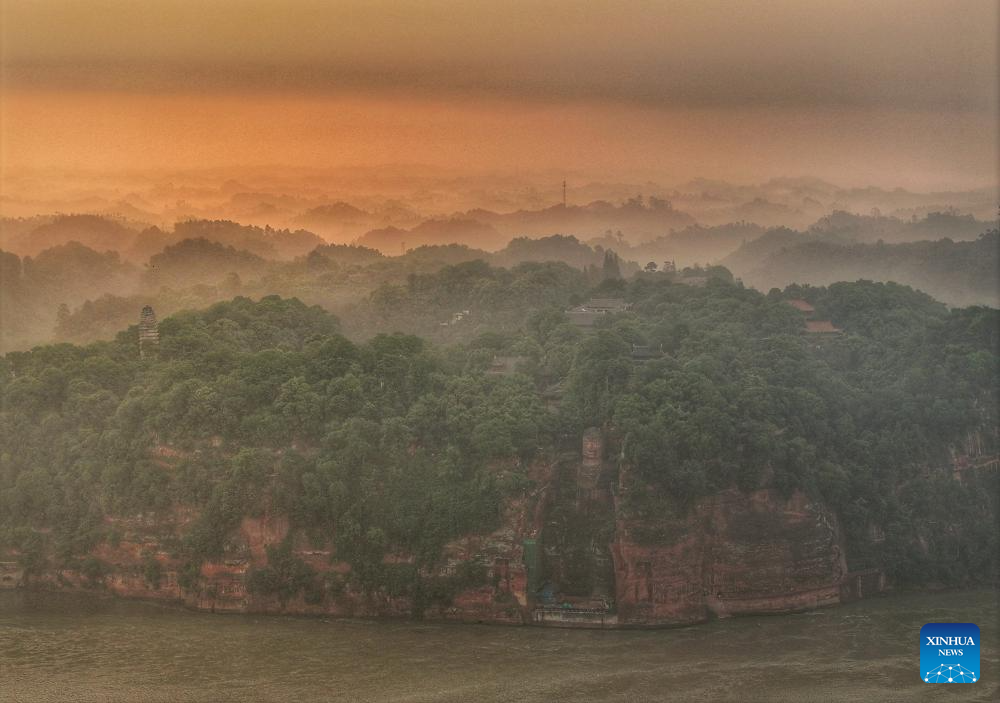
This aerial drone photo shows the Leshan Giant Buddha at dawn in southwest China's Sichuan Province, June 4, 2024. Carved out of a hillside in the 8th century, the Leshan Giant Buddha is an area of natural beauty into which the human element has been integrated with skill and subtlety. Facing the confluence of the Minjiang, Dadu and Qingyi rivers, the 71 meters tall Giant Buddha of Leshan is one of the most important cultural treasures of China.
The Leshan Giant Buddha was inscribed on the UNESCO World Cultural Heritage list in 1996. (Xinhua/Jiang Hongjing)

This drone photo shows tourists on boats visiting the Leshan Giant Buddha in southwest China's Sichuan Province, June 4, 2024. Carved out of a hillside in the 8th century, the Leshan Giant Buddha is an area of natural beauty into which the human element has been integrated with skill and subtlety. Facing the confluence of the Minjiang, Dadu and Qingyi rivers, the 71 meters tall Giant Buddha of Leshan is one of the most important cultural treasures of China.
The Leshan Giant Buddha was inscribed on the UNESCO World Cultural Heritage list in 1996. (Xinhua/Jiang Hongjing)
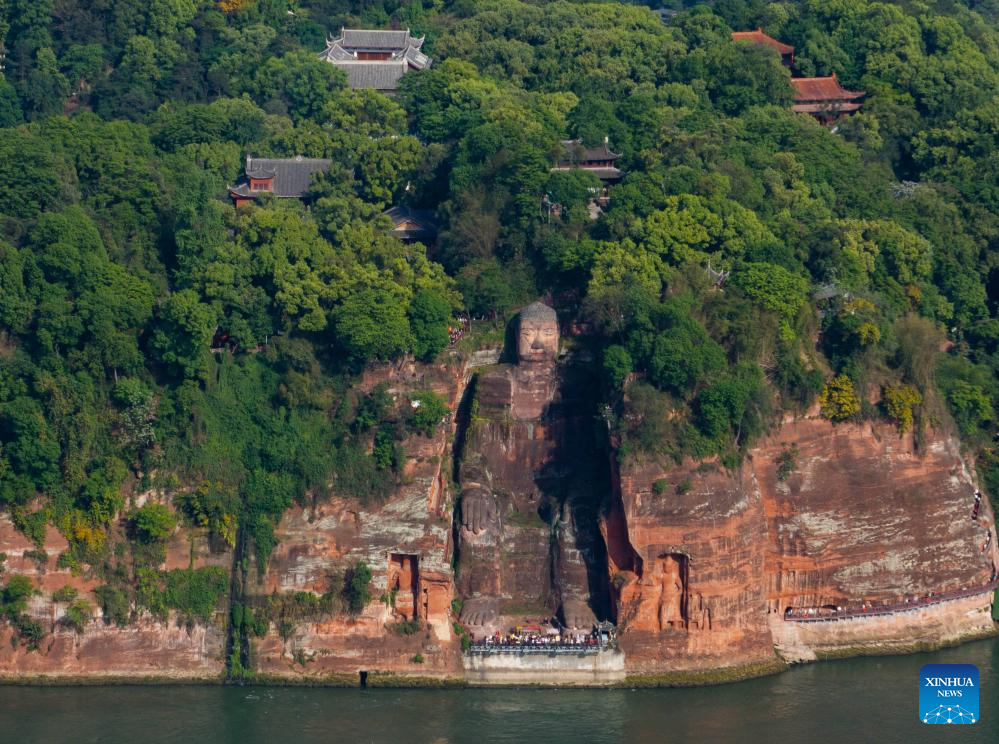
This aerial drone photo shows the Leshan Giant Buddha in southwest China's Sichuan Province, April 18, 2024. Carved out of a hillside in the 8th century, the Leshan Giant Buddha is an area of natural beauty into which the human element has been integrated with skill and subtlety. Facing the confluence of the Minjiang, Dadu and Qingyi rivers, the 71 meters tall Giant Buddha of Leshan is one of the most important cultural treasures of China.
The Leshan Giant Buddha was inscribed on the UNESCO World Cultural Heritage list in 1996. (Xinhua/Jiang Hongjing)
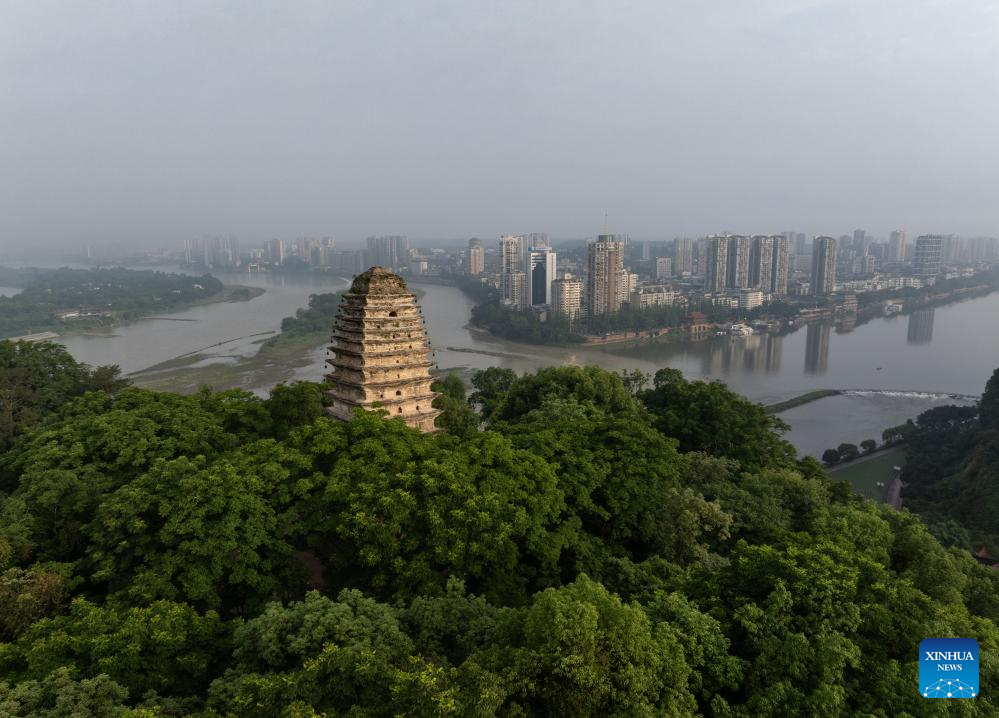
This aerial drone photo shows the skyline of the city of Leshan seen from the Leshan Giant Buddha scenic area in southwest China's Sichuan Province, June 4, 2024. Carved out of a hillside in the 8th century, the Leshan Giant Buddha is an area of natural beauty into which the human element has been integrated with skill and subtlety. Facing the confluence of the Minjiang, Dadu and Qingyi rivers, the 71 meters tall Giant Buddha of Leshan is one of the most important cultural treasures of China.
The Leshan Giant Buddha was inscribed on the UNESCO World Cultural Heritage list in 1996. (Xinhua/Jiang Hongjing)
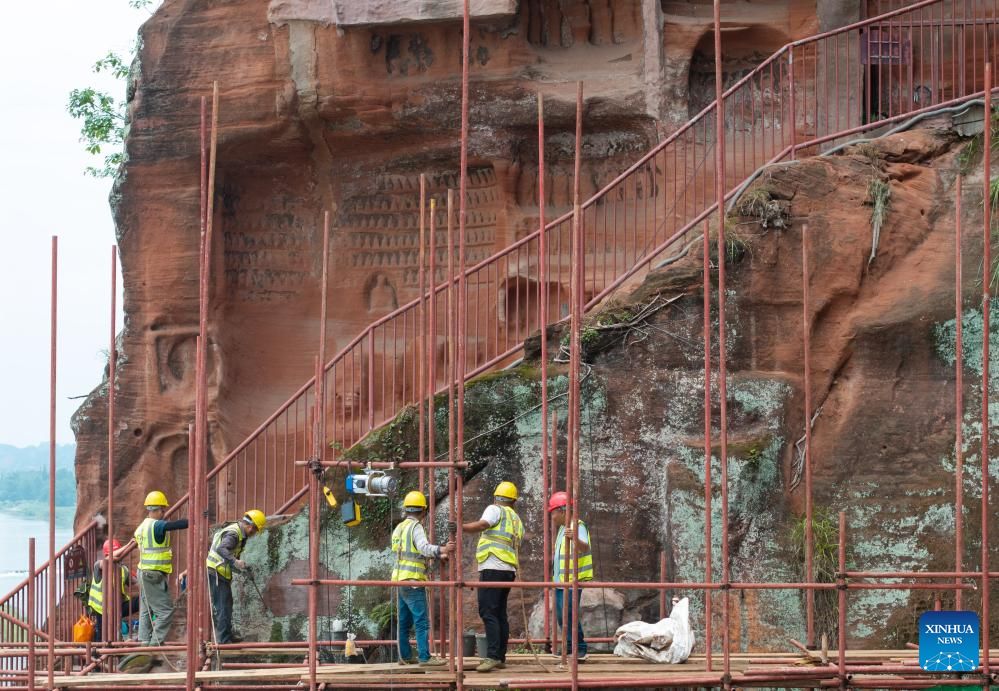
This drone photo shows workers reinforcing a hillside around the Leshan Giant Buddha in southwest China's Sichuan Province, June 4, 2024. Carved out of a hillside in the 8th century, the Leshan Giant Buddha is an area of natural beauty into which the human element has been integrated with skill and subtlety. Facing the confluence of the Minjiang, Dadu and Qingyi rivers, the 71 meters tall Giant Buddha of Leshan is one of the most important cultural treasures of China.
The Leshan Giant Buddha was inscribed on the UNESCO World Cultural Heritage list in 1996. (Xinhua/Jiang Hongjing)
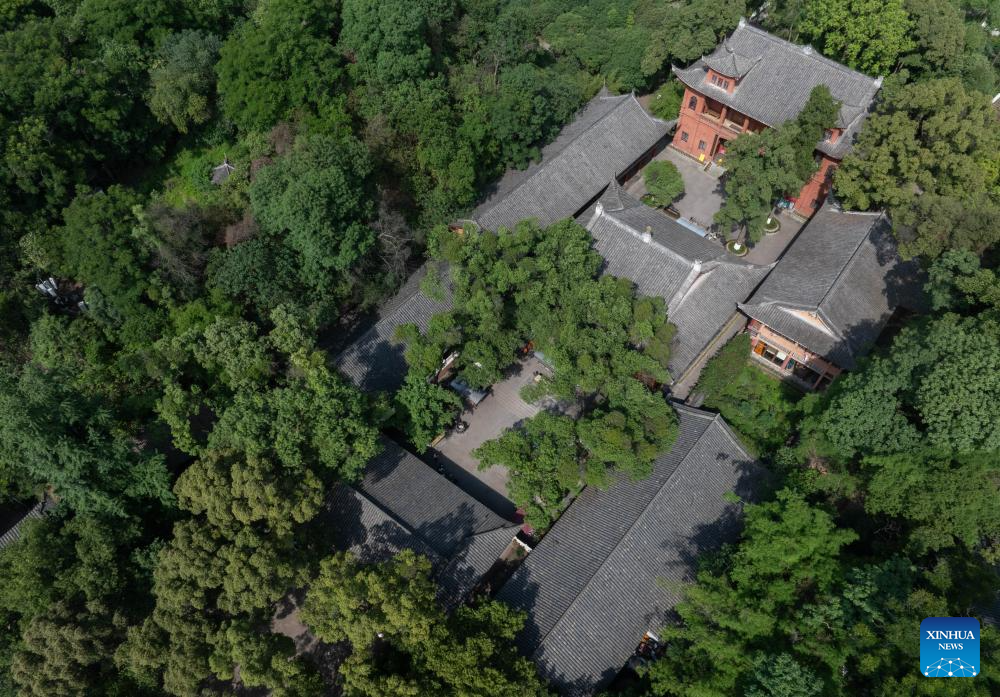
This aerial drone photo shows a temple complex at the Leshan Giant Buddha scenic area in southwest China's Sichuan Province, June 5, 2024. Carved out of a hillside in the 8th century, the Leshan Giant Buddha is an area of natural beauty into which the human element has been integrated with skill and subtlety. Facing the confluence of the Minjiang, Dadu and Qingyi rivers, the 71 meters tall Giant Buddha of Leshan is one of the most important cultural treasures of China.
The Leshan Giant Buddha was inscribed on the UNESCO World Cultural Heritage list in 1996. (Xinhua/Jiang Hongjing)
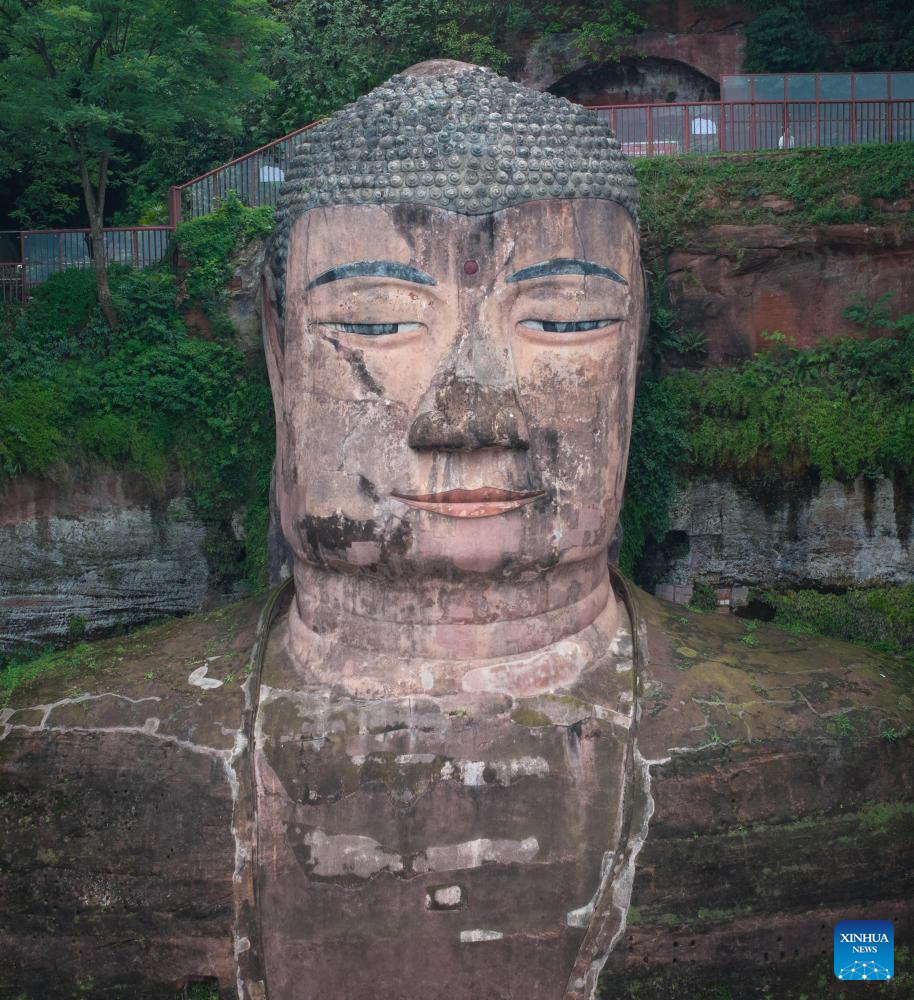
This drone photo shows a part of the Leshan Giant Buddha in southwest China's Sichuan Province, June 4, 2024. Carved out of a hillside in the 8th century, the Leshan Giant Buddha is an area of natural beauty into which the human element has been integrated with skill and subtlety. Facing the confluence of the Minjiang, Dadu and Qingyi rivers, the 71 meters tall Giant Buddha of Leshan is one of the most important cultural treasures of China.
The Leshan Giant Buddha was inscribed on the UNESCO World Cultural Heritage list in 1996. (Xinhua/Jiang Hongjing)
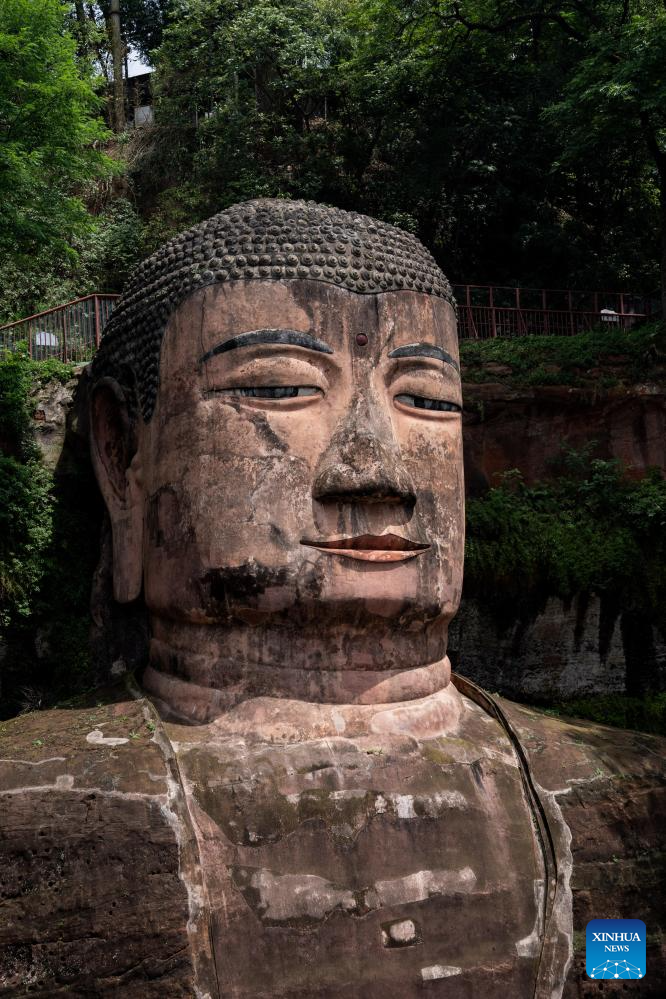
This photo shows a part of the Leshan Giant Buddha in southwest China's Sichuan Province, June 4, 2024. Carved out of a hillside in the 8th century, the Leshan Giant Buddha is an area of natural beauty into which the human element has been integrated with skill and subtlety. Facing the confluence of the Minjiang, Dadu and Qingyi rivers, the 71 meters tall Giant Buddha of Leshan is one of the most important cultural treasures of China.
The Leshan Giant Buddha was inscribed on the UNESCO World Cultural Heritage list in 1996. (Xinhua/Jiang Hongjing)
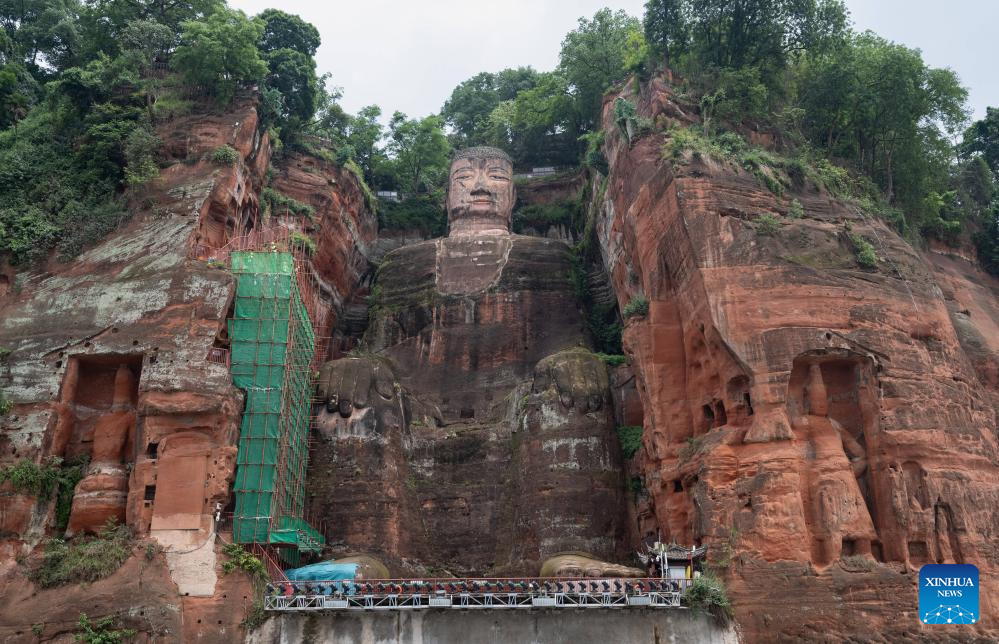
This photo shows the Leshan Giant Buddha in southwest China's Sichuan Province, June 4, 2024. Carved out of a hillside in the 8th century, the Leshan Giant Buddha is an area of natural beauty into which the human element has been integrated with skill and subtlety. Facing the confluence of the Minjiang, Dadu and Qingyi rivers, the 71 meters tall Giant Buddha of Leshan is one of the most important cultural treasures of China.
The Leshan Giant Buddha was inscribed on the UNESCO World Cultural Heritage list in 1996. (Xinhua/Jiang Hongjing)

This aerial drone photo shows the Leshan Giant Buddha in southwest China's Sichuan Province, June 4, 2024. Carved out of a hillside in the 8th century, the Leshan Giant Buddha is an area of natural beauty into which the human element has been integrated with skill and subtlety. Facing the confluence of the Minjiang, Dadu and Qingyi rivers, the 71 meters tall Giant Buddha of Leshan is one of the most important cultural treasures of China.
The Leshan Giant Buddha was inscribed on the UNESCO World Cultural Heritage list in 1996. (Xinhua/Jiang Hongjing)
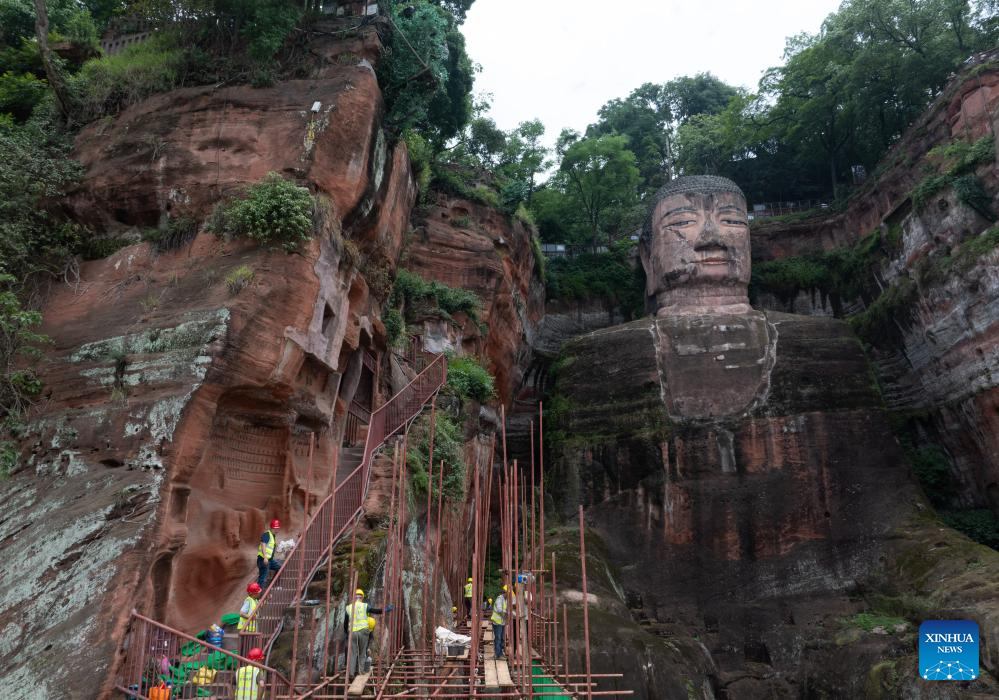
This drone photo shows workers reinforcing a hillside around the Leshan Giant Buddha in southwest China's Sichuan Province, June 4, 2024. Carved out of a hillside in the 8th century, the Leshan Giant Buddha is an area of natural beauty into which the human element has been integrated with skill and subtlety. Facing the confluence of the Minjiang, Dadu and Qingyi rivers, the 71 meters tall Giant Buddha of Leshan is one of the most important cultural treasures of China.
The Leshan Giant Buddha was inscribed on the UNESCO World Cultural Heritage list in 1996. (Xinhua/Jiang Hongjing)



